Far right hopes for victory but stalemate looms
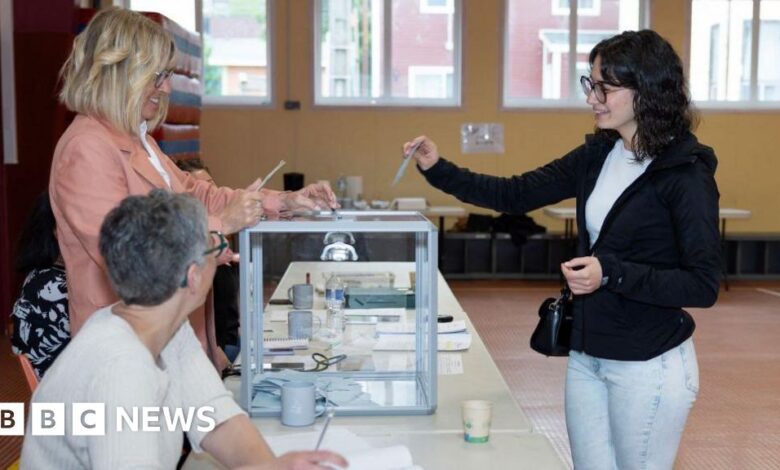
Via Paul Kirby, BBC News in Paris
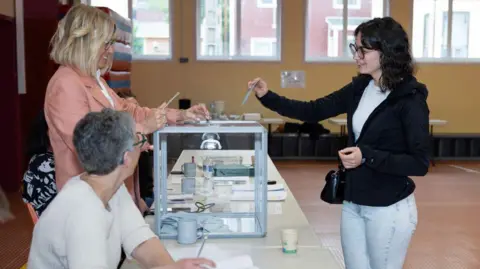 CHANTAL BRIAND/AFP
CHANTAL BRIAND/AFPFrance will vote in one of its most important elections in years on Sunday, with the far-right hoping for a historic victory, but political deadlock a more likely outcome.
This is the first time that the anti-immigration National Rally (RN) party of Marine Le Pen and Jordan Bardella has a realistic chance of running a government and gaining complete control of the National Assembly.
But after the RN’s first-round victory in last Sunday’s extraordinary parliamentary election, hundreds of rival candidates withdrew to give others a better chance of defeating the far-right.
Voting begins in mainland France at 08:00 (06:00 GMT) and the first exit poll results will be released 12 hours later.
Whatever the outcome, it is difficult to see President Emmanuel Macron getting out of this difficult situation.
Four weeks ago, he said the responsible solution would be to call a snap vote in response to the RN’s victory in the European elections, minutes after the party’s 28-year-old leader Jordan Bardella challenged him to do so.
The two-round election has sent shockwaves through a country preparing for the Paris Olympics on July 26. Security has been tightened and 30,000 police are now deployed amid heightened political tensions.
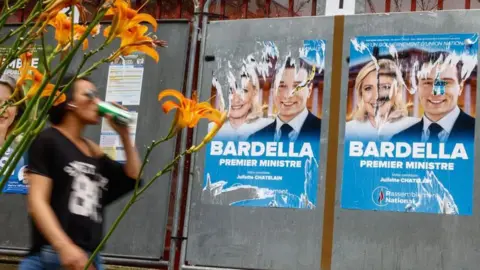 Mohammed Badra/EPA-EFE/REX/Shutterstock
Mohammed Badra/EPA-EFE/REX/ShutterstockThere are fears of violence in Paris and other French cities regardless of the vote result, and a planned protest outside the National Assembly on Sunday evening has been banned.
In Dreux, a historic old town on the road to Normandy, Sunday’s vote takes place on the day the Olympic flame passes. “For us, it’s a big event, bigger than the election,” Pauline said at the tourist office.
The fire has been moving across France for nearly two months and Dreux has planned a week of festivities to mark its arrival.
“Macron should wait until after the Olympics,” Antoine, a Dreux resident, told the BBC.
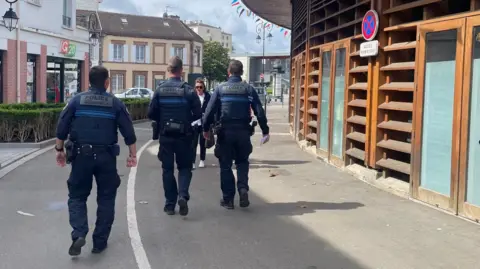
Veteran commentator Nicolas Baverez believes the president has not only ruined his presidency but also opened the gates of power to the far right. “He has compromised the hosting of the 2024 Paris Olympics, which could deal a final blow to France’s prestige and image,” he wrote in Le Point on the eve of the vote.
The constituency containing Dreux is one of the notable races in the second round of this election.
Candidates like Marine Le Pen and Jordan Bardella have won their seats, winning more than half the vote. But 500 other contests are being decided in runoffs, mostly involving two or three candidates.
Former conservative cabinet minister Olivier Marleix was defeated in the first round by far-right candidate Olivier Dubois. Both qualified for the second round, along with a candidate from the left-wing New Popular Front, which is currently second nationally.
But because Nadia Faveris was narrowly beaten into third place by her conservative opponent, she withdrew from the race “to prevent the National Rally”.
A voter named Morgan expressed skepticism that whoever wins will make any changes in this town.
There have been 217 such withdrawals across France, including 130 Popular Front candidates and 81 from the president’s Ensemble coalition.
And that has dramatically changed the balance of this crucial general election.
Projections after the first round of voting on Sunday gave the RN a fighting chance of winning an absolute majority of 289 seats, but final exit polls on Friday showed that target was now out of reach, with 205 to 210 seats the maximum it could win.
The parties trying to block RN’s victory range from the radical left, Communists and Greens to Macron’s centrists and conservatives. They say they are protecting the Fifth Republic from the extreme policies of the far right.
The National Rally has watered down many of its policies, but still wants to give French citizens “national priority” over immigrants in jobs and housing. It wants to abolish automatic citizenship for the children of immigrants who have lived in France for five years between the ages of 11 and 18. It also wants to ban dual nationals from dozens of sensitive jobs.
The polls aren’t necessarily reliable. Each of the 500 races is a local contest, and voters don’t follow the advice of political parties.
If the RN wins more than 250 seats, it could seek allies to form a minority government. President Macron’s party has had to settle for a similar number until he became frustrated with his limited ability to pass reforms in parliament.
Professor Armin Steinbach of the HEC business school in Paris believes that such a government is unlikely. He believes it would soon face a vote of no confidence, and constitutionally, France cannot have another general election for at least another year.
Another potential scenario is a “grand coalition” that would include most of the other parties, except for the radical France Unbowed (LFI), which Macron’s coalition and the conservatives see as extremist.
The idea has gained some support in recent days, but Green Party leader Marine Tondelier has made it clear that “there will be no Macronist prime minister”, whatever happens.
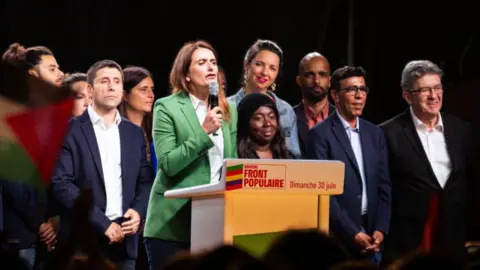 Telmo Pinto/SOPA Images
Telmo Pinto/SOPA ImagesThere is also talk of a technocratic government, similar to the one that ran Italy during the eurozone debt crisis. But instead of choosing experts from outside politics, it could include politicians with proven expertise in specific areas.
In any case, France is entering uncharted territory, said Jean-Yves Dormagen of the Cluster 17 institute.
President Macron himself has announced that he will not resign and will continue to serve his final three years in office.
“We will have Macron as a lame duck president who created this mess without having to do so,” Prof Steinbach told the BBC. “And he is losing legitimacy.”
France’s immediate concern is to have some kind of government in place during the Olympics.
Constitutional expert Benjamin Morel believes the president could form a national unity government until the Paris Olympics are over.
“That will give the parties time to reach an agreement between now and the start of the school year and the next budget,” he told Le Figaro.





